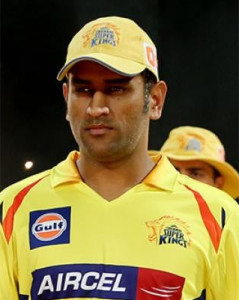Registered with the Registrar of Newspapers for India under R.N.I 53640/91
Vol. XXVIII No. 8, August 1-15, 2018
Instinct powered CSK…
by R. Mohan Resident Editor, Deccan Chronicle, Chennai

M.S. Dhoni
The triumph of Chennai Super Kings in the IPL comes as the very anterior of the performance metrics and statistics-loaded approach of the scientific world of modern sport. The victory pays no compliment to the ‘Moneyball’ way of hiring smart with the Sabermetric method of scouting and analysing players. The CSK chose its players on pure instinct, on familiarity and ‘cricketing’ knowledge of their strengths and weaknesses. This is more like the racehorse trainer method of recommending a thoroughbred.
Chennai Super Kings is no Oaklands Athletics baseball team. It has never been cash-strapped in its nine of 11 seasons in the IPL. Where CSK is so different from the Oakland team is in its betting on instinct to pick players it is happy with rather than go the modern way of soaking up the stats and picking the undervalued lot and try to assemble a competitive team at economical pricing.
No Sabermetrics for CSK, only pure old instinct of its wise coach Stpehen Fleming and its experienced skipper Mahendra Singh Dhoni. It appeared they didn’t even have the calendar app to keep track of their players’ birthdays because age was not a factor in their choice of players either. They seemed to believe that the older the cricketer, the brainier his performance in a format that is otherwise thought to be an increasingly young man’s game.
The IPL teams tend to come to the auction tables after a load of research into player analytics like their batsmen’s T-20 strike rates and the economy rates of their bowlers, with the new ball and at the death. While most would like to believe that the cheque books of the owners are always good for the escalating bids on players, there are teams that have made it their business to buy smart, as Kings XI Punjab may have done with Chris Gayle. There was no guarantee he would last the course though.
What makes the CSK approach so different is in pinning faith in an ageing set of players just because they are familiar with them. But, as Dhoni explained, it was their knowledge of the player’s fitness levels that was germane to sport and not age. This is unusual thinking in an age in which the computer is the boss, because it can at the touch of a button spew out analytics and statistics on every aspect of a cricketer’s game, much as analytics-obsessed Pro Sport of USA does in detailing players’ game analyses.

Stephen Fleming.
“It is a great dynamic. It is about using the strength of a remarkable captain, with a strong franchise, with a good game plan,” said coach Fleming even as he praised his captain’s handling of the ageing battler Shane Watson, who was wrapped in cotton wool, his work as an all-rounder cut and his placement in the inner circle designed to leave all his energies free for smacking the ball out of the park from his slot at the top of the order.
“We always like players who are multi-talented,” Fleming said of the man who singlehandedly made the chase in the final seem so easy. And to think he was considered “a failure” at Royal Challengers, Bangalore where he batted in the middle order. This indicated that man management had done the trick and not a table of averages and strike rates.
The X factor in CSK’s cricket was its easy dressing room atmosphere in which Dhoni’s Captain Cool avatar is most beneficent. It would be fair to say CSK is a players’ team as much as Dhoni is the cricketer’s cricketer and ‘Minimum Management’ has been the mantra of the owners. Maybe, that is one reason why a team with nine men over 30 could win the IPL, that too with a team picked on the captain’s instincts rather than a computer programme. This is not the way of modern cricket, which is said to suffer from ‘paralysis by analysis’, as one England cricketer put it. But Dhoni’s way has often surprised by being the best and this is just another instance of sporting instinct prevailing. (Courtesy: Straight Bat).
helped by Watson, Rayudu
by A Special Correspondent
Chennai Super Kings were deservedly crowned IPL XI Champions, 2018. The victory in the final was authoritative and emphatic as the power-packed century from the blade of a Australian all-rounder Shane Watson’s was.
CSK was among the fancied sides to lift the IPL XI trophy despite the fact that – to be honest indeed – their bowling attack was a bit ragged. Plus they had 11 players above the age of 30. Some of us locals were initially peeved that there were not many Tamil Nadu players in its ranks as before. This was particularly distressing as CSK had a whole lot of players who had never played first class cricket while the experienced State players had to seek pastures in other franchises.
Test opener Murali Vijay, who had excellent outings for CSK during the early years of the IPL and had also done well for Kings XI Punjab in 2016, including a short stint as Captain, played just one game for CSK. The other Tamil Nadu players Narayan Jagadeesan, just could not break in as it could’ve been only at the expense of Dhoni.
It was certainly hard that Ravichandran Ashwin was not bought at the auction while the choice fell on former Indian off-spinner Harbhajan, however, was not used for more than two overs in each of the games that he played.
Ravindra Jadeja too bowled just 24 balls in CSK’s first four games put together. Some even joked that he was playing as a specialist fielder and South African leg spinner Imran Tahir too got few opportunities.
Undoubtedly, South African paceman Lungi Ngidi was the outstanding user of the new ball in the tournament. His economy rate and his length and line made him an extremely difficult bowleer for the opposition batsman. Ngidi’s pace was disconcerting and his death bowling was most penetrative than even the experienced Bravo. He was CSK’s best purchase.
Rajasthan seamer Deepak Chahar was a good choice to use the new ball and was extremely useful to the side. Perhaps, the franchise owners could’ve picked up one of the State’s most successful seamer, Krishnamoorthy Vignesh too instead of some raw and untested players. Mumbai’s Shardul Thakur was disappointing. While his ‘knuckle’ ball was both a flop and bluff, it is her that a Tamil Nadu seamer would’ve proved to be ideal.
Inspite of these initial disappointments plus the early injuries, CSK supporters stood solidly behind their team. Veterans Watson and Dwayne Bravo gave their best to the side’s ascendency during the tournament with both and ball. The England players pacemen Mark Wood and left-arm David Willey and batsman Sam Billings were found wanting.
The success of CSK was without doubt batsman Ambati Rayudu. It was a good ploy on Dhoni’s part to send him in as an opener with Watson. When South African captain Faf du Plessis was used as an opener, Rayudu was dropped to number four and struggled in that position. Apart from one innings, du Plessis was a flop in the top slot. He would’ve ideally suited CSK at number four.
Rayudu was the new MVP for the franchise with his most profilic IPL season: 586 runs in 15 innings at a strike rate of 153. What was special about Rayudu was that he converted even good balls into boundary balls with his nifty footwork. He stepped down the track to 50 balls this season and hit 133 runs without being dismissed.
The CSK fielding was good despite the fact that most of its fielders were in the 30 plus group. Their slow-moving legs did come into the spotlight. CSK’s ground fielding was – as one must admit – full of bloopers, but they have tried to cover up for that with their catching. Having taken 82.7 per cent of catches in the league stage, CSK finished among the best catching sides this season. Only Mumbai Indians fared better.
“They’re 35-36, not 55-56. A massive amount has been made of it. I’m here to win the competition for the franchise. And that’s why we value experience because we think it gives us the best chance… Dwayne Bravo, Shane Watson and MS Dhoni all these guys still have a lot of cricket left to play,” said Stephen Fleming on CSK’s ageing squad.
Fleming relentlessly kept bidding for the Australian all-rounder, Shane Watson, and ultimately bought him for four times his base price of Rs.1crore. And Watson repaid the faith, featuring in all but one match for CSK, scoring 438 runs in 14 innings at a strike rate of 145.03. He single-handedly won the game for Rajasthan Royals in Pune with a 51-ball century and then came his 57-ball 117 not out in the final.
Dhoni proved to be a truly evergreen hero for CSK. His dot ball percentage was truly lower this year and, more importantly, he was the top-scorer in the death overs this season with 297 runs off 148 balls, including 24 sixes and 16 fours, at an average of nearly 100. The power game that seemed to be fading resurfaced again at times, helping him to score 455 runs in 15 innings at a strike rate of 150.66. He was not at his best but Fleming considered his batting “excellent”.

